land
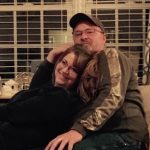
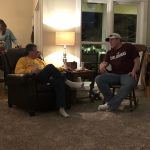 My brother-in-law, Chris Hadlock has had a very busy summer. Last year, he and his wife, my sister, Allyn purchased the land where his parents lived, and he grew up, and had the old home torn down, because it was in disrepair. Then, they built a new house on his favorite place on earth, his childhood home on the Platte River. The house was finished in time for the holidays last year, and because they love to entertain, we have all been the beneficiaries of their beautiful new home. The Spencer Family Christmas Party was held there and a wonderful time was had by all. We had the Spencer Family New Year’s Eve Party there and again enjoyed a wonderful party. And I know there will be many other gatherings to come, including a barbecue this weekend as our cousin Bill Spencer will be here from Wisconsin for a visit.
My brother-in-law, Chris Hadlock has had a very busy summer. Last year, he and his wife, my sister, Allyn purchased the land where his parents lived, and he grew up, and had the old home torn down, because it was in disrepair. Then, they built a new house on his favorite place on earth, his childhood home on the Platte River. The house was finished in time for the holidays last year, and because they love to entertain, we have all been the beneficiaries of their beautiful new home. The Spencer Family Christmas Party was held there and a wonderful time was had by all. We had the Spencer Family New Year’s Eve Party there and again enjoyed a wonderful party. And I know there will be many other gatherings to come, including a barbecue this weekend as our cousin Bill Spencer will be here from Wisconsin for a visit.
They still have work to do on the house, as they plan to finish the upper level, but the lower level is done. The spring brought with it, the beginning of the plans Chris and Allyn have for the outdoor areas of the property. 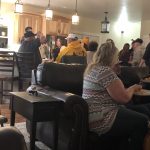
 They used the time of Covid-19 and Social Distancing for a retaining wall project on the east side of their house, where the builders dug the dirt out to build the house. It really does look great. That just goes to show what can be accomplished when we have lots of extra time on our hands. I think a lot of people had social distancing projects in the works. When you see your house all day long, you really begin to notice the things that need to get done.
They used the time of Covid-19 and Social Distancing for a retaining wall project on the east side of their house, where the builders dug the dirt out to build the house. It really does look great. That just goes to show what can be accomplished when we have lots of extra time on our hands. I think a lot of people had social distancing projects in the works. When you see your house all day long, you really begin to notice the things that need to get done.
Chris really loves to work on the land they now have, and the back yard that borders the river is a wonderful incentive to really make it into a sanctuary. Because I have spent time in their back yard, I can tell you that it was beautiful, peaceful, and quiet. Their home and property sits far back from any highway, and even far back from the closest road to get to their driveway. Their driveway is long, and the house sits in a little valley at the end of the driveway. That effectively eliminates traffic noises, and allows you to sit and listen to the birds and the 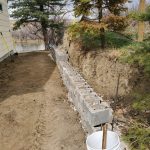
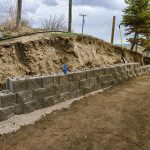 river as it meanders by. Peace and quiet just doesn’t get better than that. I suppose it’s like camping out at your own house, except they aren’t sleeping in a tent or camper. Instead, they are sleeping in the awesome log bed that Chris made for them. Chris has a knack for wood work, having done work on other cabins, as well as chainsaw carving, both of which he excelled at. It is always nice when you can do some of the construction and other building work for yourself, as it saves a lot of money in the end. Chris has proven himself in all these areas. Today is Chris’ birthday. Happy birthday Chris!! Have a great day!! We love you!!
river as it meanders by. Peace and quiet just doesn’t get better than that. I suppose it’s like camping out at your own house, except they aren’t sleeping in a tent or camper. Instead, they are sleeping in the awesome log bed that Chris made for them. Chris has a knack for wood work, having done work on other cabins, as well as chainsaw carving, both of which he excelled at. It is always nice when you can do some of the construction and other building work for yourself, as it saves a lot of money in the end. Chris has proven himself in all these areas. Today is Chris’ birthday. Happy birthday Chris!! Have a great day!! We love you!!
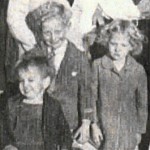
 My Uncle Larry was born during the years of the Great Depression, in an era of big families. He was the 4th child and first son of my grandparents, George and Hattie Byer. While times were tough, the one thing that George and Hattie had plenty of was love. The family was rich in that. My mother, Collene Spencer, followed Uncle Larry in quick succession, arriving when he was just 20 months old. Following Mom, Uncle Wayne arrived two years later. Their childhood would be spent as close friends and allies, along with the associated sibling arguments too, I’m sure. While I’m not sure how the boys felt about Mom tagging along in things, they didn’t really complain too much, and defended their sister when needed. For her part, Mom considered these brothers, the only ones she had, to be…maybe her charges too somehow. She might very well be prone to protecting them, whether they needed it or not, even against their mother…to her detriment sometimes, because it earned her the same punishment that Grandma Byer was dishing out to her sons. Still, my mom looked up to and loved her brothers. I suppose that to a degree, being the girl between the brothers made her a bit of a tomboy, but it also shaped her into the wonderful woman who became my mom.
My Uncle Larry was born during the years of the Great Depression, in an era of big families. He was the 4th child and first son of my grandparents, George and Hattie Byer. While times were tough, the one thing that George and Hattie had plenty of was love. The family was rich in that. My mother, Collene Spencer, followed Uncle Larry in quick succession, arriving when he was just 20 months old. Following Mom, Uncle Wayne arrived two years later. Their childhood would be spent as close friends and allies, along with the associated sibling arguments too, I’m sure. While I’m not sure how the boys felt about Mom tagging along in things, they didn’t really complain too much, and defended their sister when needed. For her part, Mom considered these brothers, the only ones she had, to be…maybe her charges too somehow. She might very well be prone to protecting them, whether they needed it or not, even against their mother…to her detriment sometimes, because it earned her the same punishment that Grandma Byer was dishing out to her sons. Still, my mom looked up to and loved her brothers. I suppose that to a degree, being the girl between the brothers made her a bit of a tomboy, but it also shaped her into the wonderful woman who became my mom.
Uncle Larry was a determined man, who wanted something better for his family. I believe that land ownership was a part of that desire. I remember wondering as a kid, why he and my Aunt Jeanette chose to live in the country. The rest of the family at that time, were city dwellers (though Casper wasn’t a large city) and it always seemed strange to me that they lived in the country. Lots of land, however, gave them the ability to have a big place to entertain, and outbuildings to pursue any other activities they might be interested in, such as ceramics. They proudly hosted ceramics sessions with any of the family who wanted to join in. Grandma and Grandpa Byer were some of those who loved going out to get their “Crafty Side” on.
All of my grandparents kids lived most of their lives in Wyoming, most of them in Casper, so when Uncle Larry took a transfer to Louisiana with Texaco, I remember being quite shocked. I’m not sure why I should have been, because my own mother had lived for 5 years in Superior, Wisconsin, where my older sister, Cheryl and I were both born. Still, at the time, I felt kind of shocked. The refinery where Uncle Larry worked, here in Casper, closed, and he wasn’t old enough to retire, so he could take the transfer or take a layoff. The choice was simple really. They mover to Louisiana and lived their until his retirement before returning to live the rest of his life in 
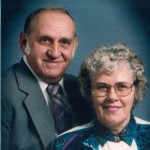 Casper, where both of their children, Larry and Tina both live too. I remember being quite happy when they moved back here. I felt like having the family back together again. My husband, Bob and I loved running into them on occasion, often at a home improvement store, where we were both looking for some new item we needed for our houses. When he passed away, I felt very sad that those impromptu meeting would now be over. Uncle Larry passed away on December 22, 2011, and I still miss him very much. Today would nave been Uncle Larry’s 86th birthday. Happy birthday in Heaven, Uncle Larry. We love and miss you very much.
Casper, where both of their children, Larry and Tina both live too. I remember being quite happy when they moved back here. I felt like having the family back together again. My husband, Bob and I loved running into them on occasion, often at a home improvement store, where we were both looking for some new item we needed for our houses. When he passed away, I felt very sad that those impromptu meeting would now be over. Uncle Larry passed away on December 22, 2011, and I still miss him very much. Today would nave been Uncle Larry’s 86th birthday. Happy birthday in Heaven, Uncle Larry. We love and miss you very much.
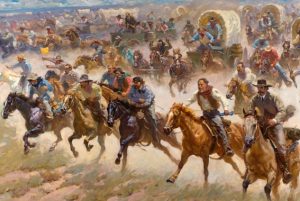 As Americans began to expand to the West, new territories had to be opened for settlement. Of course, this was not always met with approval from the Indian nations who were living there at the time. Nevertheless, the settling of this nation would not be stopped, and while it was handled wrong in many ways, it was inevitable. Nearly two million acres of land in Oklahoma Territory had been preciously deemed unsuitable for white settlement, and so were given to the Native Americans who had been previously removed from their traditional lands to allow for white settlement. The relocations began in 1817. By the 1880s, Indian Territory was home to a variety of tribes, including the Chickasaw, Choctaw, Cherokee, Creek, Cheyenne, Comanche, and Apache.
As Americans began to expand to the West, new territories had to be opened for settlement. Of course, this was not always met with approval from the Indian nations who were living there at the time. Nevertheless, the settling of this nation would not be stopped, and while it was handled wrong in many ways, it was inevitable. Nearly two million acres of land in Oklahoma Territory had been preciously deemed unsuitable for white settlement, and so were given to the Native Americans who had been previously removed from their traditional lands to allow for white settlement. The relocations began in 1817. By the 1880s, Indian Territory was home to a variety of tribes, including the Chickasaw, Choctaw, Cherokee, Creek, Cheyenne, Comanche, and Apache.
By the 1890s, with the improvements in agricultural and ranching techniques led some white Americans to realize that the Indian Territory land could be valuable, so they began to pressure the United States government to allow white settlement in the region. In 1889, President Benjamin Harrison agreed, making the first of a long series of authorizations that eventually removed most of Indian Territory from Indian control. To begin the process of white settlement, President Harrison chose to open a 1.9 million acre section of Indian Territory that the government had never assigned to any specific tribe. I suppose it was a way to ease into it without taking land from any specific tribe…initially anyway. However, subsequent openings of sections that 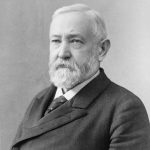 were designated to specific tribes were achieved primarily through the Dawes Severalty Act of 1887, which allowed whites to settle large swaths of land that had previously been designated to specific Indian tribes.
were designated to specific tribes were achieved primarily through the Dawes Severalty Act of 1887, which allowed whites to settle large swaths of land that had previously been designated to specific Indian tribes.
On March 3, 1889, Harrison announced the government would open the 1.9 million-acre tract of Indian Territory for settlement precisely at noon on April 22, 1889. Anyone could join the race for the land, but no one was supposed to jump the gun. With only seven weeks to prepare, the land-hungry Americans quickly began to gather around the borders of the irregular rectangle of territory. They were referred to as “Boomers,” and by the appointed day more than 50,000 hopefuls were living in tent cities on all four sides of the territory. At precisely high noon, thousands of would-be settlers make a mad dash into the newly opened Oklahoma Territory to claim cheap land. I can only imagine the chaos. The events that day at Fort Reno on the western border were typical of the entire process. At 11:50am, soldiers called for everyone to form a line. When the hands of the clock reached noon, the cannon of the fort boomed, and the soldiers signaled the settlers to start. With the crack of hundreds of whips, thousands of Boomers streamed into the territory in wagons, on horseback, and on foot. All told, from 50,000 to 60,000 settlers entered the territory that day. By nightfall, they had staked thousands of claims either on town lots or quarter section farm plots. Towns like Norman, Oklahoma City, Kingfisher, and Guthrie sprang into being almost overnight.
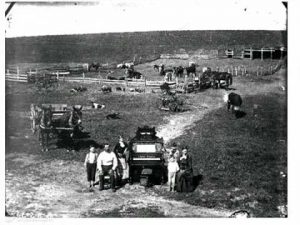 An extraordinary display of both the pioneer spirit and the American lust for land, the first Oklahoma land rush was also plagued by greed and fraud. Cases involving “Sooners,” who were people who had entered the territory before the legal date and time overloaded courts for years to come. I’m sure that the Indians weren’t pleased either, and I would imagine that there was periodic trouble over the whole process too. The government attempted to improve the operations of subsequent runs by adding more controls, finally adopting a lottery system to designate claims. By 1905, white Americans owned most of the land in Indian Territory. Two years later, the area once known as Indian Territory entered the Union as a part of the new state of Oklahoma.
An extraordinary display of both the pioneer spirit and the American lust for land, the first Oklahoma land rush was also plagued by greed and fraud. Cases involving “Sooners,” who were people who had entered the territory before the legal date and time overloaded courts for years to come. I’m sure that the Indians weren’t pleased either, and I would imagine that there was periodic trouble over the whole process too. The government attempted to improve the operations of subsequent runs by adding more controls, finally adopting a lottery system to designate claims. By 1905, white Americans owned most of the land in Indian Territory. Two years later, the area once known as Indian Territory entered the Union as a part of the new state of Oklahoma.
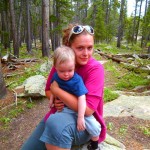
 There are all kinds of people in this world. There are the high stress movers and shakers, and then there are those people, like my niece, Cassie Iverson, who like living life at a slower pace. For many of those who love the simple life, like Cassie, that means loving all things nature. Living in northern Wyoming, with Powell’s wide open spaces, and yet the Big Horn Mountains not too far away, nature is simply all around Cassie. She loves taking photographs of flowers and wildlife, so the mix of nature around her is perfect for her hobby. Cassie has also branched out, and has taken a few family photos for friends, and of course, her family. Her work is very creative and amazing.
There are all kinds of people in this world. There are the high stress movers and shakers, and then there are those people, like my niece, Cassie Iverson, who like living life at a slower pace. For many of those who love the simple life, like Cassie, that means loving all things nature. Living in northern Wyoming, with Powell’s wide open spaces, and yet the Big Horn Mountains not too far away, nature is simply all around Cassie. She loves taking photographs of flowers and wildlife, so the mix of nature around her is perfect for her hobby. Cassie has also branched out, and has taken a few family photos for friends, and of course, her family. Her work is very creative and amazing.
Being a nature girl, means that Cassie loves things like camping with her family, fishing, and horses. Cassie and her husband, Chris take their kids, Lucas and Zoey out to the river to go fishing often. Not only is fishing a great pastime, for those who like the chance to slow life down a little bit, but it is also a healthy way to feed your family without spending a lot of money. Cassie’s top priority is her family. She is a great mom and her children, while very different in their abilities, have flourished under her loving care.
As I look through Cassie’s pictures of horses, her love for them is very evident. I would not be surprised if, at some time in the future, Cassie and Chris buy a piece of land somewhere to raise their own horses. It isn’t an inexpensive venture, but I think that most people who raise horses…or even one horse, find it to be very rewarding. It is also a great hobby for the children when they are a little older, and a great way for the family 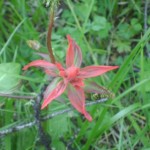
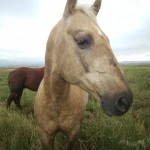 to spend time together. I can see them taking the kids on a camping trip using horses as the way to get there.
to spend time together. I can see them taking the kids on a camping trip using horses as the way to get there.
I think that many of us allow our lives to get so caught up in activities, running here and there, and worrying about what everyone else thinks, that we forget to simply live…or maybe to live simply. Maybe we don’t understand just how freeing the simple life can be…but Cassie knows, because she is living that dream. Today is Cassie’s birthday. Happy birthday Cassie!! Have a great day!! We love you!!
 The Spencer line in America began with four brothers who, along with one sister and her husband, immigrated to America in about 1630. The brother my family descends from is Michael, of whom the least is known. I’m not sure why so little is known about my ancestor, but I have decided to start a journey to find out…along with the journeys of so many others I’m working on. I hope not to hit a dead end. My sister, Cheryl Masterson inspired this new tangent I have set out on, when she asked me which line we came from. She and I are both members of the Spencer Historical and Genealogical Society’s Facebook group. Her thought was to see if there were other members who come from Michael Spencer’s line, but to date, there are not. Michael’s line is a bit of a mystery at this point. While we know that we and a number of other family members come from that line, we are not a group large in number.
The Spencer line in America began with four brothers who, along with one sister and her husband, immigrated to America in about 1630. The brother my family descends from is Michael, of whom the least is known. I’m not sure why so little is known about my ancestor, but I have decided to start a journey to find out…along with the journeys of so many others I’m working on. I hope not to hit a dead end. My sister, Cheryl Masterson inspired this new tangent I have set out on, when she asked me which line we came from. She and I are both members of the Spencer Historical and Genealogical Society’s Facebook group. Her thought was to see if there were other members who come from Michael Spencer’s line, but to date, there are not. Michael’s line is a bit of a mystery at this point. While we know that we and a number of other family members come from that line, we are not a group large in number.
So, let us begin. About five years after his arrival in America, that is, in or about 1635, Michael and his brother Gerard moved to Lynn, Essex County, Massachusetts, where Gerard reportedly appears as a journeyman in Lynn in 1635. Then we see that after the death of his brother Michael, Gerard was appointed administrator of his brother’s estate in 1653. So, what happened to Michael between 1635 and 1653. Michael married Isabel West in 1636, the year after his move to Lynn, Massachusetts. Isabel married a second time about a year after Michael’s passing, to a man named Thomas Robbins. Michael and Isabel were the parents of five children, John, Hannah, Susannah, Michael, and William.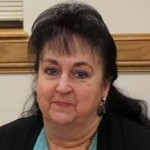
On September 1, 1634, Michael was granted four acres on the west side of the river in Cambridge. It was also recorded on October 10, 1635, that he owned one parcel on the south side of the river, also about four acres. And in the 1638 division of land at Lynn, Massachusetts he received thirty acres. Still, since he passed away at the very young age of just 42 years, I have to wonder if he was somewhat sickly. It’s possible that his sons worked the land in his stead. I have not found any indication of him being in poor health, but I also have not found any job that he held within the community either, so it makes me wonder.
On November 29, 1653, Michael’s brother Gerard was appointed administrator of Michael’s estate, and charged with the task of disposing of the estate for the needs of his children. The documentation states that the estate was small, and so it was necessary to sell it to help pay for the upbringing of his children. Bringing up five children is no inexpensive task…and at the time of Michael’s passing, none of the children were married yet. The older children might have been out of the home already, however, because on November 30, 1654 the court, with 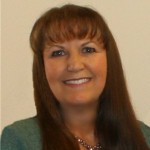 Gerard’s consent and agreement gave some of the estate to Thomas Robbins, because he was raising one of the children, Michael, who was six years old. This was because Thomas had married Isabel.
Gerard’s consent and agreement gave some of the estate to Thomas Robbins, because he was raising one of the children, Michael, who was six years old. This was because Thomas had married Isabel.
That is about the extent of Michael Spencer’s story. His life was too short to have done very much with it, but he does hold as a claim to fame, the fact that he was indeed one of the original four Spencer brothers who was responsible for most of the Spencer line in America today. I can tell you that his children and other descendants faired nicely, however…because, my sisters and I are five of them. And there are many more, just in my grandparents family alone family alone…even if our total number is small.
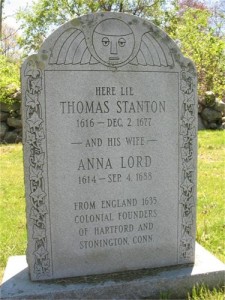 In trying to connect the Stanton side that exists through my dad’s half brother, Norman Willis Spencer, to the Stanton side that exists in Bob’s family through his grandma, Nettie Noyes Knox, I have come up with some interesting information. While I have not made the connection that I’m almost certain exists between the two sides, I did find out that within the Noyes side of the family, there is a Stanton family member who was of some significance to America too. His name was Thomas Stanton, and he was Bob’s 7th great grandfather. There are many ways for a person to have a degree of influence on American history, or history of any nation. Some people become kings or presidents. Others might have been great warriors, while still others might have made some great discovery.
In trying to connect the Stanton side that exists through my dad’s half brother, Norman Willis Spencer, to the Stanton side that exists in Bob’s family through his grandma, Nettie Noyes Knox, I have come up with some interesting information. While I have not made the connection that I’m almost certain exists between the two sides, I did find out that within the Noyes side of the family, there is a Stanton family member who was of some significance to America too. His name was Thomas Stanton, and he was Bob’s 7th great grandfather. There are many ways for a person to have a degree of influence on American history, or history of any nation. Some people become kings or presidents. Others might have been great warriors, while still others might have made some great discovery.
Thomas Stanton was a trader and an accomplished Indian interpreter and negotiator in the colony of Connecticut. He is first noted in historical records as an interpreter for John Winthrop Jr in 1636. He fought in the Pequot War, which took place between 1634 and 1638. He nearly lost his life in the Fairfield Swamp Fight in 1637. In 1638 he was a delegate at the Treaty of Hartford, which ended the war. In 1643, the United Colonies of New England appointed Stanton as Indian Interpreter.
He began a close alliance with the Thomas Lord family, who may have been friends from England and who had recently emigrated from Towcester, England. He married Thomas Lord’s daughter, Anna Lord, about 1636 and went into a merchant business alliance with Richard Lord. Some of Thomas’ land transactions involved serious difficulties, because people often sold and resold land without obtaining a clear title. An Indian sachem gave Quonochontaug to Stanton, but did the chief really own all of this land? A Stanton tract might overlap a tract claimed by another settler. These and other transactions like them, resulted in lengthy and costly litigation. Questions about the ownership of some of Stanton’s land and ambiguities in the will led to years of family and legal fighting.
But, probably the biggest claim to fame that Thomas Stanton had was that he was one of the four founders of Stonington, Connecticut, and one of the first settlers of Hartford, Connecticut. The present territory of Stonington was part of lands that had belonged to the Pequot people, who referred to the areas making up Stonington as Pawcatuck and Mistack. It was named 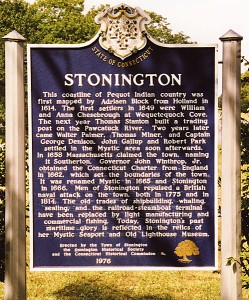 “Souther Towne” or Southerton by Massachusetts in 1658. It became part of Connecticut in 1662 when Connecticut received its royal charter. Southerton was renamed “Mistick” in 1665 and again renamed Stonington in 1666. Thomas Miner, Walter Palmer, William Chesebrough and Thomas Stanton were its four founders.
“Souther Towne” or Southerton by Massachusetts in 1658. It became part of Connecticut in 1662 when Connecticut received its royal charter. Southerton was renamed “Mistick” in 1665 and again renamed Stonington in 1666. Thomas Miner, Walter Palmer, William Chesebrough and Thomas Stanton were its four founders.
Upon Thomas death on Dec 2,1677, his will could not be located, and legal battles concerning the distribution of his property continued for years. When his wife, Anna died 11 years later, his estate was still unsettled. At some point, when going through some papers belonging to the city of Hartford, Connecticut, someone found the will, but that would not bring the estate to the point of being settled. The estate remained unsettled for a total of 40 years before the will was accepted and the estate settled. That is the kind of thing that can happen when money and land are involved.
Yesterday, we went to a barbecue at my sister, Caryl and her husband, Mike’s place out west of Casper. It is a place they are actually working on, and plan to live on when the retire. For now, they live in Rawlins, where he is a supervisor at the Sinclair Refinery and she is a Respiratory Therapist at the Memorial Hospital of Carbon County. The land they purchased will give them the opportunity to do something Caryl has wanted to do for as long as I can remember…have horses.
When Caryl was younger, she decided that she wanted to learn to ride horses, and she began taking riding lessons…oddly in the same general area of the land she and Mike have now 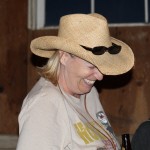 purchased. Caryl loved those riding lessons, and became quite good at riding. Then, as with all of us, life takes us down a different road than the one we expected to take, and the plans we had made in our youth are traded for the plans we will now make as adults. After moving to San Diego, California, and then to Bremmerton, Washington, and finally Twin Falls, Idaho, she found herself back in Casper, and then moving to Rawlins. There weren’t many opportunities to ride horses where she was living.
purchased. Caryl loved those riding lessons, and became quite good at riding. Then, as with all of us, life takes us down a different road than the one we expected to take, and the plans we had made in our youth are traded for the plans we will now make as adults. After moving to San Diego, California, and then to Bremmerton, Washington, and finally Twin Falls, Idaho, she found herself back in Casper, and then moving to Rawlins. There weren’t many opportunities to ride horses where she was living.
Now, coming full circle, her life’s journey will once again place her in Casper, and living in a place where she can finally realize a dream that she has had for so many years. It didn’t occur to me that Caryl might actually be a country girl. I had lived in the 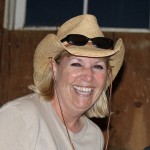 country for 16 years, before realizing that the country was not where I wanted to be, and Caryl had lived all her life in town, and now plans to be a country girl. It is so strange how life changes sometimes.
country for 16 years, before realizing that the country was not where I wanted to be, and Caryl had lived all her life in town, and now plans to be a country girl. It is so strange how life changes sometimes.
I’m so excited for Caryl to be able to realize her dream. She seems so much in her element. It’s funny how I never really saw the cowgirl in her before. It’s just right for her. I’m sure she feels like their retirement can’t come soon enough. Today is Caryl’s birthday, so I guess she is one year closer to that big day. Happy birthday Caryl!! Have a great day!! We love you!!
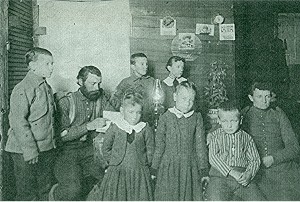 Back in the late 1800’s, life in the United States was rugged, especially if you didn’t live in the East. The people who lived here had a pioneer spirit, and they were used to making their own way. That didn’t necessarily mean that they were poor, although some lost everything they had. The amazing thing about that is that even if they did lose everything, many of them found a way to start over, and didn’t move back to the East.
Back in the late 1800’s, life in the United States was rugged, especially if you didn’t live in the East. The people who lived here had a pioneer spirit, and they were used to making their own way. That didn’t necessarily mean that they were poor, although some lost everything they had. The amazing thing about that is that even if they did lose everything, many of them found a way to start over, and didn’t move back to the East.
It was that pioneer spirit in those early settlers of this nation. They proved they had what it took to make a life in a rugged and sometimes brutal land, that they had the guts to turn this land into the great nation it is today. There are still people out there like that today. People like my cousin, Shirley and her family who live in the mountains of Washington state, and when I say they live there, I mean they live mostly off the land. They hunt and fish, and they grow a garden. That pioneer spirit still lives strong in them.
Our Great Grandpa And Grandma Spencer raised their 6 children in various places, but at this point in their lives, they were living near Rock Falls, Wisconsin, the old O’Dell place, which is another thing I find funny. It seems like once a family lives on a place, it always belongs to them, or at least their name always belongs to the place. So, no matter how many families followed the O’Dell’s, the house would always carry their name. That was a tradition I never could figure out, but it still seems to be the case.
Our great grandparents and great great grandparents built this country with their blood, sweat and tears, and most importantly with pure gut! They had what it takes to make it in a land that could be brutal enough to kill a man, much less a woman, if they weren’t strong enough.
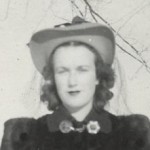 Every once in a while, you find a person who seems to be living in the wrong time. My Aunt Ruth always seemed like that to me. Don’t get me wrong, she functioned very well in the time she lived in, but her true calling was always in the wild. She thrived on it. She was at home the most when she was out in the woods and especially with her beloved animals. She loved the land, and everything that went with it. She probably should have lived in the old west, when the pioneers were making their way to the wide open spaces where they could get land.
Every once in a while, you find a person who seems to be living in the wrong time. My Aunt Ruth always seemed like that to me. Don’t get me wrong, she functioned very well in the time she lived in, but her true calling was always in the wild. She thrived on it. She was at home the most when she was out in the woods and especially with her beloved animals. She loved the land, and everything that went with it. She probably should have lived in the old west, when the pioneers were making their way to the wide open spaces where they could get land.
Sure, she did just fine when she lived in the cities too, but her heart always seemed to yearn for the land. She reminded me of the women of the west, for whom the land seemed to almost run in their veins. It was a part of them and they 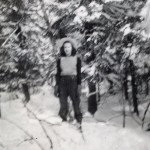 were a part of it. When her family moved to the mountains of Washington, she finally found the place of her heart.
were a part of it. When her family moved to the mountains of Washington, she finally found the place of her heart.
When my Aunt Ruth was a girl, her family spent a lot of time at the family farm, when her mother taught her to garden and cook and live off the land. And all of her beloved animals where there too, and she loved them all. Animals of all kinds. She had several dogs that always seemed to hang around her, because animals can tell if you have a kind heart. She was a natural on a horse, and was able to ride like a pro, of course, again, the horses knew that she was the kind of person they wanted to be around. They loved her as much as she loved them.
There are people who seem to be living in the wrong time. They love everything about a 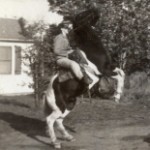 past era, and they seem to be so suited for a different time. And yet, here they are, in this time and this place, because what era we are born in is simply not our choice. And maybe they don’t even think about the fact that they seem more suited to another era, but it is something that can be obvious to those around them. That is how my Aunt Ruth always appeared to me. I had never known someone who so loved the land…the woods…the animals…gardening, growing things out of her precious earth. But that was my Aunt Ruth…a beautiful face, a loving heart, in an era where she seemed a bit out of place, because she was more of a pioneer spirit. And that is what she will always be to me.
past era, and they seem to be so suited for a different time. And yet, here they are, in this time and this place, because what era we are born in is simply not our choice. And maybe they don’t even think about the fact that they seem more suited to another era, but it is something that can be obvious to those around them. That is how my Aunt Ruth always appeared to me. I had never known someone who so loved the land…the woods…the animals…gardening, growing things out of her precious earth. But that was my Aunt Ruth…a beautiful face, a loving heart, in an era where she seemed a bit out of place, because she was more of a pioneer spirit. And that is what she will always be to me.
 Watching the news every day, we hear more and more about flooding and sandbagging. Snow pack in many areas is 300% above normal or even more. Rivers are very high, and lots of people are sandbagging in the hope of holding back the water. People are being forced to move to higher ground, and some have had to abandon their homes.
Watching the news every day, we hear more and more about flooding and sandbagging. Snow pack in many areas is 300% above normal or even more. Rivers are very high, and lots of people are sandbagging in the hope of holding back the water. People are being forced to move to higher ground, and some have had to abandon their homes.
Wyoming had a lot of water last year, but nothing like they are expecting this year. I have lived here since I was 3 years old, and I don’t remember ever having water this high, but I suppose I might not have been paying much attention as a child. Now, as an insurance agent, I have clients who live by the river, and it does concern me. I know they have flood insurance, but I don’t want their homes destroyed. You can replace the home, but the memories and pictures and things are gone, and cannot be replaced.
Bob’s extended family lives in Forsyth, Montana, and they are right by the Yellowstone River. Flooding has already started there. I have seen pictures of standing water on the football field of the high school. Bob’s uncle lives just on the other side of the levee from the river, and said that if his sump pump wasn’t working, he would have 4 feet of water in his basement.
I occurs to me that an event like this one, with flooding in so many states can change lives in such  a short time…sometimes forever. The floods along the Mississippi that are devastating so much of Louisiana…not to mention the rest of the states along the Mississippi, are just horrible. Of course, I don’t wish drought on anyone, but I wish there was a balance of the two.
a short time…sometimes forever. The floods along the Mississippi that are devastating so much of Louisiana…not to mention the rest of the states along the Mississippi, are just horrible. Of course, I don’t wish drought on anyone, but I wish there was a balance of the two.
I know this season will pass, and the waters will recede. People will rebuild, and move forward again. Human beings are a resilient bunch. We tend to fight our way back from the brink in many ways. Of course, after the return, we will find ourselves forever changed because of the time we spent in the water’s path.


